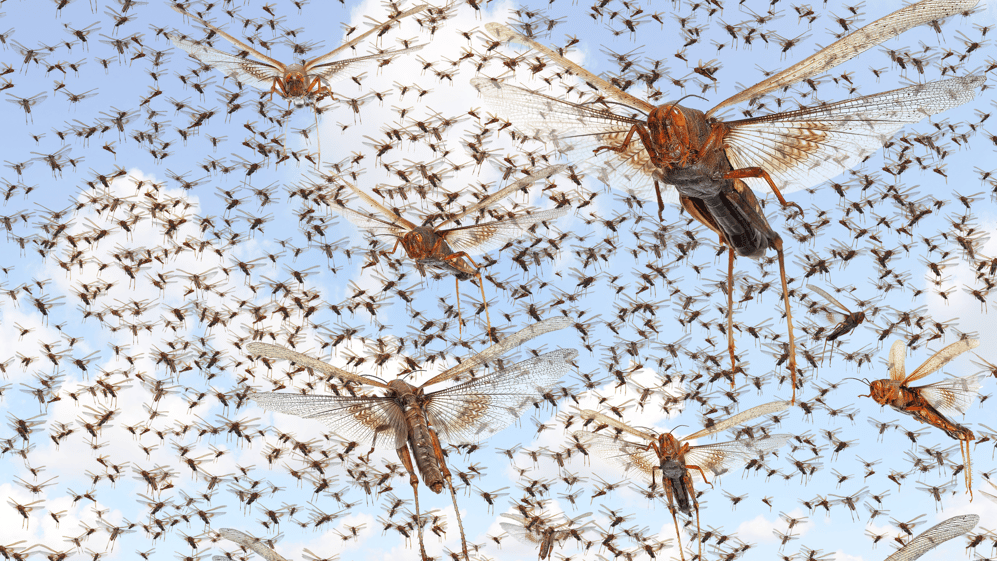It is that time of year in Indiana when the air is not only warm but also annoyingly full of flies and mosquitos. There are measures one can take. Diligently close doors and windows, hang fly paper, spray insecticide, remove standing water, wear insect repellent—the list goes on. There is no perfect solution except for winter. One way or the other, we can’t escape summer without a few mosquito bites and flies in the food.
Judah had a similar problem, but on a much grander scale. Through the prophet Joel, we learn that God sent locusts to discipline the people of Judah for their idolatry. The prophet describes the swarm as an army climbing over walls and bursting through windows, as a thief breaking into a home. These locusts consumed all the produce of the fields. The result was catastrophic for the people of Judah. With no produce, they were unable to feed the livestock or trade with other nations for items Judah could not produce on her own, and they had nothing with which to make a sacrificial offering to the Lord.
Study Joel 2:17–19, 24–25
17Between the vestibule and the altar let the priests, the ministers of the LORD, weep and say, “Spare Your people, O LORD, and make not Your heritage a reproach, a byword among the nations. Why should they say among the peoples, ‘Where is their God?’”
18Then the LORD became jealous for His land and had pity on His people. 19The LORD answered and said to His people, “Behold, I am sending to you grain, wine, and oil, and you will be satisfied; and I will no more make you a reproach among the nations. …
24“The threshing floors shall be full of grain; the vats shall overflow with wine and oil. 25I will restore to you the years that the swarming locust has eaten, the hopper, the destroyer, and the cutter, My great army, which I sent among you.”
The final verse of the passage above sheds light on the Lord’s divine intentionality. In Christian circles and beyond, it is often heard that God only allows calamity to befall the world. But notice the verb in verse 25: God sent the locusts. In truth, whether the Lord allows or sends, the matter is still fully under His control. However, to realize that God not only permits trouble but also brings it draws the reader to a sobering respect for the Almighty.
The Law in Joel 2
Finally, God sends the locusts to produce repentance in the heart of the people of Judah. As opposed to punishing the people in retribution, the Lord is disciplining; He wants to restore Judah. Nevertheless, the Lord is not satisfied with a fleeting, shallow repentance. He is not looking for demonstrations of grief, such as the imposition of ashes and sackcloth or the rending of clothes. Instead, there is to be genuine sorrow over sin and an earnest effort to do better.
The same is expected of us today. While our salvation is not dependent on how well we repent, God expects that His children take a sober inventory of sin, that we hate and disregard it, and with the Holy Spirit’s strength, we strive toward obedience. How often do we indifferently speak the words of confession in worship and leave with no intention of doing better? How seldom do we consider the areas of life in which we struggle most with sin: work, recreation, time alone, dating, friends? What needs to change?
God mercifully works repentance because He knows the day of His Son’s return. On this day, the opportunity to repent will have passed. Those who have not come to know Jesus as Savior will indeed bend the knee to Him, but will sadly enter eternal death.
The Gospel in Joel 2
In verse 18, we learn that the Lord became jealous for His people. In our sinful world, the word jealous carries the connotation of envy, even dangerous obsession. Not so with God. He is jealous in the best sense of the word. God is complete in Himself, needing nothing. Yet He is jealous in love. So much does He desire our salvation that He sent His only Son, Jesus Christ, to the cross to buy us back from sin. God is jealous for us not because He is lonely or insecure but rather because He knows that the best place we can be is with Him. He loves us too much to leave us alone.
In mercy for the people of Judah, the Lord not only removes the locusts but also restores what the insects destroyed. The people could once again feed the animals, trade, and offer sacrifices to God. More important, He brought the people back from idolatry.
In a real sense, by restoring the produce of the fields, God provided His own sacrifice. That is, He gave Judah what she would offer back to Him. Consider then, that Jesus connects Himself to bread and wine in Holy Communion and is anointed with oil for burial before His crucifixion—three products of the field.
As God provided the sacrifice in Joel’s account, so He provides the sacrifice for the sins of the world. God gave us someone worth infinitely more than grain, wine, or oil. Jesus Christ, God’s own Son, is the all-sufficient offering for sin. He is the final offering, which no locust can destroy. Jesus is the only sacrifice that can bring us forgiveness and everlasting life.
Read more about Jesus in the Old Testament in The Messiah












